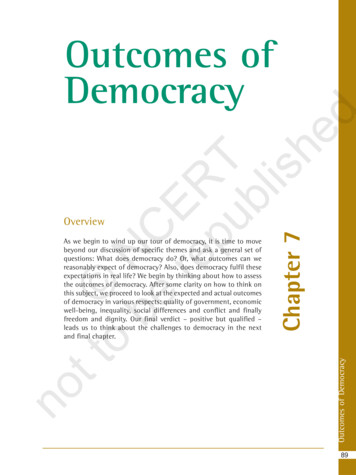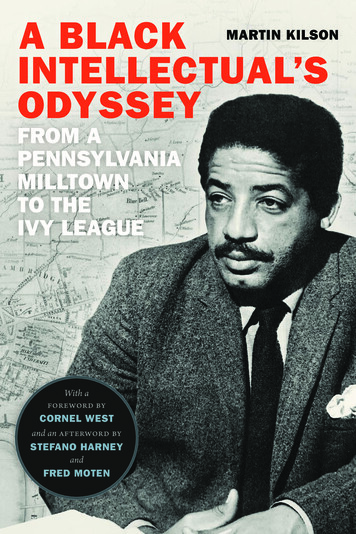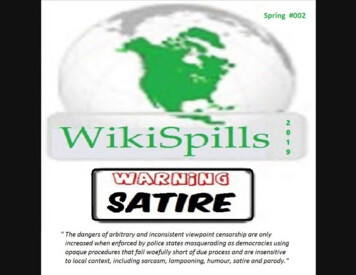
Transcription
AP European History Period 4.4Student Lecture NotesDemocracies in the 1920sI.Weimar RepublicA. At the end of World War I, the Social Democratic Party (SPD)took control of the government on November 9, 1918.1. Kaiser Wilhelm II abdicated that same evening.2. The SPD had been the largest party in Germany prior to thewar.3. Fear of communist revolutions throughout the countryprompted Philip Scheidemann to proclaim a republic, butwithout official consent from any other parties.Use space belowfor notesB. Threats from the Left1. Spartacists, a group of communists led by Rosa Luxemburgand Karl Liebknecht, took control of Berlin for a week inJanuary 1919.2. Elements of the “Freikorps” crushed the communist uprising,killing its leaders. The “Freikorps” (Free Corps) were right-wing paramilitaryvolunteer groups that formed after the war and became thevanguard of anti-communist repression.3. Germany’s lack of experience with democratic traditions madethe Weimar’s hold on power tenuous.4. The Weimar Republic had to rely on conservative militarygroups to save it from communist outbreaks throughout thecountry.a. This hurt the republic’s prestige.b. The military supported the gov’t provided that it maintaindiscipline in the army and root out Bolshevism. In effect, the Weimar gov’t became a prisoner of theGerman armyC. Elections in January created a center-left coalition in charge ofrunning the government.1. The SPD had the most seats in the Reichstag but also sharedpower with the Center Party and the German Democratic Party.2. The capital was moved to Weimar to distance the gov’t fromthe Prussian imperial traditions of Berlin.D. Treaty of Versailles, 19191. To Germans of all political parties, the Versailles Treatyrepresented a harsh, dictated peace, to be revised orrepudiated as soon as possible.a. Article 231 placed sole blame of the war on Germany andthe terms of the peace were harsh. Germany was required to pay enormous reparations toBritain and France. 2017 HistorySage.com All Rights ReservedThis material may not be posted on any website other than HistorySage.com
HistorySage.com AP Euro Lecture NotesPeriod 4.4: Democracies in the 1920s Germany’s military strength was severely weakened.Germany lost Alsace and Lorraine to France.Germany lost eastern territory to Poland.o East Prussia was separated from the rest ofGermany by the “Polish Corridor” that extendednorth to the Baltic Sea.b. French troops would occupy the Rhineland to ensure againstGerman aggression. These territories were to be permanently demilitarized.c. France took economic control of the Saar border regionwhich was rich in coal and iron mines. The region would be administered for 15 years by theLeague of Nations. After 15 years, the people of the Saar could vote onwhether to remain part of Germany or become part ofFrance.2. France, above all, was eager to ensure its future securityagainst German aggression although it sought to punishGermany for starting the war.3. While Britain also sought to punish Germany, many Britsbelieved a healthy German economy was essential to a healthyBritish economy. John Maynard Keynes’ Economic Consequences of thePeace (1919) criticized the Versailles Treaty, declaring itspunishing of Germany would damage the Europeaneconomy.4. The Weimar gov’t in June 1919 signed the Versailles Treatyprobably dooming the Weimar Republic from the start. Conservatives, including influential military elements, sawthe signing of the treaty as a “stab in the back” or the“diktat”—the “dictated peace.”E. A new constitution was created in August 1919.1. Reichsrat: upper chamber represented the Federal states.2. Reichstag: lower house elected by universal suffrage; suppliedthe Chancellor and Cabinet.3. The president was elected for a 7-year term.4. Female suffrage was granted.F. Threats from the Right1. Kapp Putsch, 1920a. Conservative politicians and businessmen, with help fromdisgruntled army officers, took control of Berlin in Marchand declared a new government.b. Conservative parties gave their support.2. At the same time, right-wing conservatives took control ofBavaria.3. Chancellor Friedrich Ebert implored workers to defend theWeimar Republic.a. A general strike resulted which brought the country’seconomic activities to a halt.b. The putsch collapsed as a result and the republic wassaved. 2017 HistorySage.com All Rights ReservedPage 2
HistorySage.com AP Euro Lecture NotesPeriod 4.4: Democracies in the 1920s4. Though certain conservative groups failed to take powerforcefully, they continued to gain seats in the Reichstag.5. The SPD eventually withdrew from the government leaving afragile center-right coalition in charge.G. Ruhr Crisis, 19231. Reparations: As provided for in the Versailles Treaty, theAllies announced in 1921 that Germany had to pay 33 billionin reparations. Germany's economy was still weak and it could not pay allof the reparations.2. In 1923, France, led by Raymond Poincaré, occupied theindustrial Ruhr region of Germany. In response, the Weimar gov’t ordered Ruhr residents tostop working and passively resist French occupation.3. Runaway inflation occurred when Germany printed money topay reparations.a. The value of the German mark went from about 9 marksper U.S. dollar in 1919 to 4.2 trillion marks per dollar bymid-November 1923!b. This brought about a social revolution in Germany: Theaccumulated savings of many retired and middle-classpeople were wiped out.c. The middle-class resented the gov't and blamed Westerngovernments, big business, workers, Jews, and communistsfor the nation's woes. Many later supported Hitler as a result.4. Beer Hall Putsch, 1923a. In an attempted revolution, Adolf Hitler and the Nazi Partyfailed to overthrow the state of Bavaria and Hitler wassentenced to one year in jail (where he wrote Mein Kampf.)b. Hitler’s light jail term reflected conservative judges whosympathized with anti-republican views.5. Gustav Stresemann assumed leadership of Germany in 1923.a. He called off passive resistance in the Ruhr and agreed topay reparations (but also sought consideration ofGermany's ability to pay). Poincaré agreed.b. Stresemann was supported by the Social Democrats.c. Stresemann restored Germany to a normal diplomaticstatus in the European community with the Locarno Pact in1925 that guaranteed Germany’s borders with France andBelgium.6. Dawes Plan, 1924: League of Nations plan that restructuredGermany's debt with U.S. loans to Germany to pay back Britainand France, who likewise paid back the U.S.a. It resulted in a German economic recovery.b. Young Plan (1929): continuation of the Dawes Plan (butbecame moot when Great Depression hit) 2017 HistorySage.com All Rights ReservedPage 3
HistorySage.com AP Euro Lecture NotesPeriod 4.4: Democracies in the 1920sIII. France: economic problemsA. Its challenges were similar to those in Germany.B. Death, devastation, and debt from WWI created economic chaosand political unrest.C. Throughout the 1920s, the government’s multi-party system wasdominated by parties on the right (conservatives) It supported the status quo and had the backing of business,army, and Church.D. In 1926, Raymond Poincaré was recalled to office. His gov’t slashed spending and raised taxes, restoringconfidence in the economy.IV. Great BritainA. Wartime trend toward greater social equality continued, helpingmaintain social harmony.1. Representation of the Peoples Act (1928): women over 21gained the right to vote. (Representation of Peoples Act of1918 had given women over 30 the right to vote).2. Yet, the concentration of wealth in Britain was more gearedtowards the top than any other European country. The top 1% owned 2/3 of the national wealth.B. Unemployment was Britain's biggest problem in the 1920s—itreached about 12%.1. Britain had not recovered from economic losses suffered duringWWI.2. 1926 General Strike: The support for miners who feared adramatic drop in their low wages swept the country.a. The strike eventually failed.b. The gov’t outlawed such “sympathetic” labor strikes in1927.C. Growth of social welfare1. After WWI, the gov’t provided unemployment benefits of equalsize to the unemployed and supplemented those payments withsubsidized housing (200,000 units), medical aid, and increasedold-age pensions.2. The Labour party rose as a champion of the working classesand of greater social equality and took power briefly in 1924 (9months).a. Led by Ramsay MacDonaldb. The Labour Party came to replace the Liberal Party as themain opposition to conservatives. The Liberal party’s traditional 19th century support offree trade no longer seemed as relevant.c. Conservatives regained power by framing the Labour partyas pro-communist when it officially recognized the SovietUnion.3. Conservatives under Stanley Baldwin (1867-1947) ruled Britainbetween 1924 and 1929. It showed the same compromising spirit on social issues:female suffrage, expanded pensions to widows, orphansand the elderly. 2017 HistorySage.com All Rights ReservedPage 4
HistorySage.com AP Euro Lecture NotesPeriod 4.4: Democracies in the 1920sD. The Irish Question1. After the Easter Rebellion (1916) the extremist Sinn Feinfaction gained prominence in Ireland.2. This prompted a civil war between the Irish Republican Army(IRA) and the Black and Tan, England’s special occupationforces there.3. On October 1921, London created the Irish Free State, fromwhich Ulster withdrew, as part of the British Commonwealth(Northern Ireland).4. In 1922, Britain granted southern, Catholic Ireland fullautonomy after failing to suppress a bitter guerrilla war.E. Loosening of the empire1. End of its protectorate in Egypt (except the Suez Canal)2. Equality of British Dominions – Canada and AustraliaV. The Great DepressionA. Causes1. World War I debt, nationalistic tariff policies (e.g., the U.S.),overproduction, depreciated currencies, disrupted tradepolicies, and speculation created weaknesses in the economyworldwide.a. Overproduction of agriculture in Europe drove food pricesdown thus hurting farmers.b. In 1930, the U.S. instituted the extremely high HawleySmoot Tariff which resulted in retaliation by 23 othercountries.c. In 1931, Britain went off the gold standard; 20 othercountries followed suit.2. The Stock Market Crash (1929) perhaps triggered the U.S.depression and it signaled the beginning of a worldwideeconomic catastrophe.a. New York bankers began recalling loans made to Germanyand other European countries, thus exacerbating Europe’seconomic crisis.b. Long-term problems within the U.S. economy leading todepression: weak international economy, overproduction,unstable banking, certain weak industries, 1/2 of allAmericans lived below poverty line.B. Impact on Europe1. The depression shattered the fragile optimism of politicalleaders in the late 1920s.2. A decline of production occurred in every country (exceptRussia with its command economy).3. Mass unemployment resulted: Germany was hit hardest(43%); Britain 18%, U.S. 25%C.Attempted remedies1. Franklin Roosevelt's "New Deal" in the U.S. sought to reformcapitalism with increased gov't intervention in the economy.a. It influenced several European countries.b. A Keynesian approach (developed by John Maynard 2017 HistorySage.com All Rights ReservedPage 5
HistorySage.com AP Euro Lecture NotesPeriod 4.4: Democracies in the 1920sKeynes) was used after 1938 to permanently prop up theeconomy through public works programs and subsidies.2. Scandinavia's response to depression was most successfulunder its socialist gov't.3. British recoverya. Orthodox economic theory followed after 1929: Britainabandoned the gold-standard, reorganized industry,increased tariffs, reformed finances, cut gov’t spending,balanced the budget (although unemployed workersreceived barely enough welfare to live on).b. The economy recovered considerably after 1932.c. The years after 1932 were actually better than in the1920s.d. Like the U.S., Britain came out of depression permanentlydue to rearmament for WWII.4. Francea. The impact of the depression didn’t occur immediately asFrance wasn't as highly industrialized as Britain, Germanyand the U.S.b. The depression increased class tensions and gave birth to aradical right that supported gov’t reorganization alongfascist lines.c. Popular Front: The threat of fascism prompted thecreation of a coalition of republicans, socialists, communistsand radicals. Led by Leon Blúmd. “French New Deal”: Inspired by the U.S. New Deal, thegov’t encouraged a union movement and launched a farreaching program of social reform, complete with paidvacations and a 40-hr work week. It failed due to high inflation and agitation from fascistsand frightened conservatives in the Senate.e. French divisions over what actions to take in the SpanishCivil War destroyed the Popular Front in 1936.f. France remained politically divided as Germany continuedits rearmament in the late 1930s. 2017 HistorySage.com All Rights ReservedPage 6
HistorySage.com AP Euro Lecture NotesPeriod 4.4: Democracies in the 1920sPage 7Terms to KnowWeimar RepublicSocial Democratic Party (S.P.D.)“Spartacists”“Freikorps”Treaty of VersaillesArticle 231John Maynard Keynes, EconomicConsequences of the Peace, 1919“stab in the back”; “diktat”Ruhr Crisis, 1923reparationsRaymond PoincaréGustave StresemannBeer Hall Putsch, 1923Dawes PlanRepresentation of the People Act, 1928General Strike, 1926Labour Party“Irish Question”Sinn FeinIrish Republican Army (IRA)Northern IrelandStock Market Crash, 1929Great DepressionNew DealKeynesian economicsPopular FrontEssay QuestionsNote: This sub-unit is a low probability area for the free-response portion of the AP exam.In the past 10 years, 1 question has come wholly or in part from the material in thischapter. Below are some questions that will help you study the topics that have appearedon previous exams or may appear on future exams.1. What were weaknesses of the Weimar Republic? How did different political groups seekto remedy these weaknesses?2. Analyze the reasons behind the worsening of Franco-German relations in the early 1920sand improved relations after 1924.3. Evaluate the strength of the economy in the 1920s for each of the following countries: Britain Germany France4. Analyze how the Great Depression differed in its impact on various countries during the1930s? 2017 HistorySage.com All Rights Reserved
HistorySage.com AP Euro Lecture NotesPeriod 4.4: Democracies in the 1920sPage 8BibliographyPrinciple Sources:College Board, AP European History Course and Exam Description (Including the CurriculumFramework), New York: College Board, 2017McKay, John P., Hill, Bennett D., & Buckler, John, A History of Western Society, AP Edition, 8th Ed.,Boston: Houghton Mifflin, 2006Merriman, John, A History of Modern Europe: From the Renaissance to the Present, 2nd ed., New York:W. W. Norton, 2004Palmer, R. R., Colton, Joel, and Kramer, Lloyd, A History of Europe in the Modern World, 11th ed., NewYork: McGraw-Hill, 2013Other Sources:Chambers, Mortimer, et al, The Western Experience, 8th ed., Boston: McGraw-Hill, 2003Hunt, Lynn, et al, The Making of the West: People’s and Cultures, Boston: Bedford/St. Martins, 2001Kagan, Donald, et al, The Western Heritage, 7th ed., Upper Saddle River, New Jersey: Prentice Hall, 2001Kishlansky, Mark, et al, Civilization in the West, 5th ed., New York: Longman, 2003Mercado, Steven and Young, Jessica, AP European History Teacher’s Guide, New York: College Board,2007Spielvogel, Jackson, Western Civilization, 5th ed., Belmont, California: Wadsworth/Thompson Learning,2003Kagan, Donald, et al, The Western Heritage, 7th ed., Upper Saddle River, New Jersey: Prentice Hall, 2001Kishlansky, Mark, et al, Civilization in the West, 5th ed., New York: Longman, 2003Mercado, Steven and Young, Jessica, AP European History Teacher’s Guide, New York: College Board,2007Spielvogel, Jackson, Western Civilization, 5th ed., Belmont, California: Wadsworth/Thompson Learning,2003 2017 HistorySage.com All Rights Reserved
The "Freikorps" (Free Corps) were right-wing paramilitary volunteer groups that formed after the war and became the vanguard of anti-communist repression. 3. Germany's lack of experience with democratic traditions made the Weimar's hold on power tenuous. 4. The Weimar Republic had to rely on conservative military groups to save it from communist outbreaks throughout the country. a .










